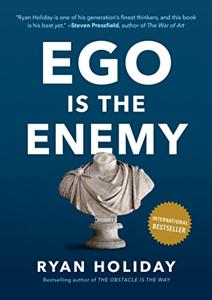
Want to learn the ideas in Ego Is The Enemy better than ever? Read the world’s #1 book summary of Ego Is The Enemy by Ryan Holiday here.
Read a brief 1-Page Summary or watch video summaries curated by our expert team. Note: this book guide is not affiliated with or endorsed by the publisher or author, and we always encourage you to purchase and read the full book.
Video Summaries of Ego Is The Enemy
We’ve scoured the Internet for the very best videos on Ego Is The Enemy, from high-quality videos summaries to interviews or commentary by Ryan Holiday.
1-Page Summary of Ego Is The Enemy
What Is Ego?
Ambition can be a driving force for success. People who are ambitious have ego. Ego is necessary to achieve goals, but it can also become unhealthy and block progress.
Ego can be a dangerous thing. It’s when you’re so wrapped up in yourself that you don’t realize what others are saying about you or even how they feel around you. You think too highly of yourself and your work, which leads to laziness and self-congratulatory behavior. If ego is defined as “self-centered ambition,” then it undermines the connection with others by not listening to them or engaging with them effectively enough to succeed on your own terms. Ego offers comfort because it gives us something to rely on, but we need humility along with confidence if we want our strengths truly evaluated accurately and objectively rather than clouded by our own perceptions of ourselves.
Aspiring to Greatness
Greatness is often an understated act. John Boyd was a fighter pilot who helped revolutionize modern warfare across the US armed forces, but he isn’t widely known for his contributions. He once asked his soldiers if they wanted to be somebody or do something important and meaningful. It’s much easier to be someone than it is to accomplish something meaningful.
Popular wisdom says that we should find our passion, but that’s not always the best advice. Passion can lead to enthusiasm and excitement, which can hide weaknesses in a person or product. Instead of passionate pursuits, it’s better to seek purpose with reasons and goals behind them.
Restraint is important. It helps you focus on what you’re doing and be open to new lessons along the way. If your boss or coworkers are rude, don’t react by being angry or resentful; instead, try to understand where they’re coming from and how that might improve your work in the future.
“The Canvas Strategy”
The canvas strategy is built on the idea of restraint. As a new employee, you should shift away from resentment and towards self-development. To follow this strategy, keep these ideas in mind:
You should probably work on your attitude.
You may think you are not as good as you believe, and that your ideas aren’t important.
You are not an expert in everything, and you need to learn more than what your education taught you.
It’s quite likely that you will be successful alongside the success of others. You can make their jobs easier by doing small tasks for them and introducing people, so they might collaborate. The best way to overcome your ego is to find ways to help your boss. If you “clear the path” for other people, you’ll have a say in what course they take.
Problems with Narratives
People should stop talking and start doing. Social media encourage people to talk a lot, but they should focus on productivity instead. People who post updates on Facebook and Twitter are misleading themselves into thinking that they’re accomplished due to their many posts. Posting status updates misleads people into believing that they have confidence, ability and accomplishment when it’s just their ego inflating itself.
Gawker blogger Emily Gould described how she struggled to write her novel. She had a six-figure book deal, but she was always distracted by social media and the Internet. This made it difficult for her to get work done in a timely manner, because those distractions were taking up time that could have been spent writing. However, she convinced herself that these distractions were necessary; after all, they helped build her personal brand on Tumblr and Twitter. In the relentless pursuit of building your personal brand, people lose sight of what really matters: accomplishments. They start focusing more on fictional advertisements than actual results or progress towards their goals. Some people like to mutter thoughts out loud as they’re working through problems or trying to figure something out, but studies show this actually slows down the process of discovery. Likewise, goal visualization helps you at the beginning of projects (so you can set realistic expectations for yourself), but after a while it produces an unrealistic sense that you’ve actually made progress when you haven’t yet achieved anything tangible. When things are hard, talking doesn’t help ; in fact, sometimes it makes things worse by giving people false hope about making real progress towards their goals






